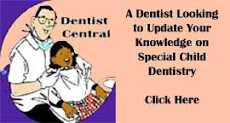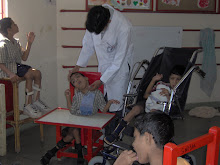There is little available literature as to a definite protocol for treating children with ADHD. Before treating the child with ADHD however it is important for the dentist to be aware of a few basic facts...
What are the dental problems of children with ADHD?
The dental problems of children with ADHD are largely non specific, that is they are a result of poor oral care. A higher caries rate, neglect of oral health needs and bleeding gums are some of the most commonly reprted disorders. A higher prevalence of bruxism and oral trauma have also been reported. These signs are suggestive of a lack of oral hygeine and difficulty in managing the child on the dental chair. Interestingly studies that have found increased behaviour management problems in these children also found that there was no increase in dental fear in children with ADHD.Bruxism induced TMJ disorders have also been reported in these children.
What medication is the child taking and how does this affect oral health or treatment?
A good drug history is imporatant to the Pediatric Dentist treating a child with ADHD. Firstly, drugs such as amphetamines can cause gingival enlargement in children. Secondly, it is important to remeber that while the medication is often given to treat hyperactivity, it is still the dentist's job to get the patient's attention. The most commonly used drug in the management of ADHD is a CNS stimulant such as Methyl Phenidiate (ritalin) . To view all the different drugs used in the treatment of ADHD click here
Are there any special precautions you must take or protocol you must follow before you treat a child with ADHD?
While no commonly accepted guidelines exist for the management of children with ADHD, we have tried to best summarize the little that exists in the literature on dentistry for children with ADHD.
Behaviour Management
The report by the NIMH suggests that the underlying condition of children with ADHD prediposes them to behaviour management problems. Keeping in mind articles that have expressed contrasting views on the subject we suggest that children with ADHD should be treated as normal children who show behaviour problems. We do not advocate sedation or management under general anesthesia unless all other forms of behaviour management have failed.
Dental Caries
While children with ADHD have a definitely higher caries rate this is due to poor oral hygiene rather than any underlying disorder. We recommend that the Pediatric Dentist be actively involved with the child's guidance counsellor or therapist to generate an interest in oral hygeine. The use of glove puppets or dolls in the clinic can greatly influence the child's interest in brushing or mainatainence of oral hygeine.
Gingival Disease
While the increased accumulation of deposits and bleeding from the gums can be attributed to poor oral hygeine it is important that the dentist be aware of the chances of amphetamine induced gingival hyperplasia. Even though the number of children actually medicated for the disease is low it is essential that the pediatric dentist be aware of the potential problem.
Dental Traumatic Injury(DTI)
An article published in Dental Traumatology reviewed the different literature available and goes as far as to suggest that the increased prevalence of traumatic dental injury in these children is a direct result of ADHD. DCSN agrees with the view of the authors that ADHD is a predisposing factor for DTI and that increased awareness and close collaboration between different disciplines involved are essential to prevent DTI in chidren with ADHD.
For a detailed account of ADHD and the mechanisms involved we would reccomend the booklet published by the National Institute of Mental Health (NIMH) to download the entire booklet click here
The suggestions expressed above are the views of DCSN and are a means to open the discusion on the best way to manage patients with ADHD. Due to the paucity of literature on the topic we welcome any improvements or additions.
Suggested Reading
Oral characteristics of children with attention-deficit hyperactivity disorder. Spec Care Dentist. 2008 May-Jun;28(3):107-10. J Evid Based Dent Pract. 2008 Mar;8(1):35-6. No abstract available. Dental caries and oral health behavior in children with attention deficit hyperactivity disorder. Eur J Oral Sci. 2007 Jun;115(3):186-91. J Am Dent Assoc. 2007 Apr;138(4):475-82; quiz 535, 537. Review.
Dent Traumatol. 2007 Jun;23(3):137-42. Review.








1 comment:
As per the literature in your blog, diagnosis of ADHD is difficult. The following kept in mind must be the basis for diagnosis
To confirm diagnosis of ADHD,
these behaviour must……..
-Occur in more than 1 setting
-Before 7 years
- symptoms must last for more than 6 month duration
- must make Difficult for the child to function
Post a Comment